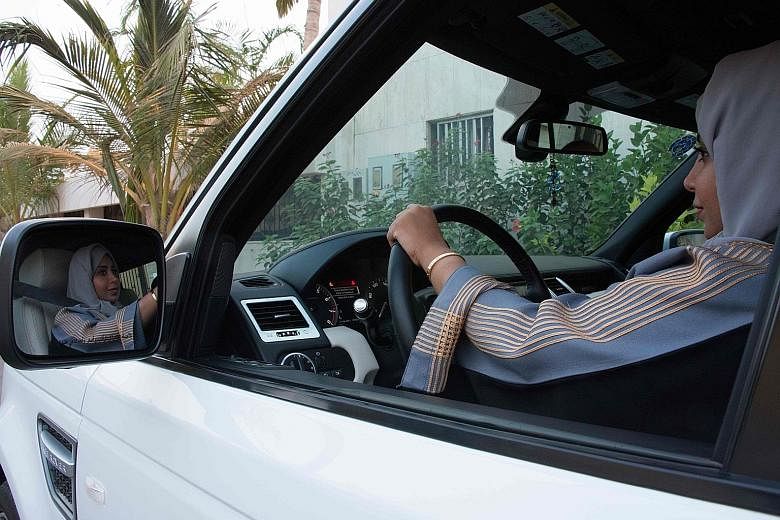RIYADH • A day after Saudi Arabia lifted a ban on women driving, the conservative kingdom took another step towards modernising its image by naming a woman to a senior government post for the first time.
Ms Eman Al-Ghamidi was appointed assistant mayor of Al Khubar governorate "as part of a plan to boost the number of females in leadership positions in line with Vision 2030", said the Centre for International Communication at the Ministry of Culture and Information on Wednesday.
Vision 2030, a vast plan of economic and social reforms, aims to raise women's share of the labour market to 30 per cent from 22 per cent at present.
Ms Al-Ghamidi's appointment came just 24 hours after King Salman Abdulaziz Al Saud issued a decree to end a ban on women driving. In addition to making it easier for them to get to work, the country's interior minister, Prince Abdulaziz bin Saud bin Nayef, said yesterday it will reduce the number of car crashes in a nation with one of the world's worst traffic-related death rates, but he did not say exactly how.
While the change does not take effect until June next year, the announcement was so abrupt that it stunned the country. Indeed, other firsts in the last week alone have included allowing women into the national sports stadium in Riyadh and a concert in Jeddah.
Observers see the tidal wave of change as the handiwork of the new young crown prince, Mohammed bin Salman Al-Saud, 31, and note that he believes it will usher him to the throne.
A country built on an alliance between a royal family and the descendants of an ultra-conservative Muslim cleric, religious scholars, in theory, determine what rules in Saudi Arabia abide by Islamic law. The monarch's authority to govern is ultimately supposed to rest on his compliance with the syariah law as interpreted by those scholars.
-
30%
W hat Vision 2030, a vast plan of economic and social reforms, aims to raise women's share of the labour market to, from 22 per cent now.
But Saudi Arabia has struggled through its history with how to reconcile modernisation with loyalty to religious heritage. That debate heated up as oil wealth enriched the state, bringing in unfamiliar customs and technologies like television, public education and cars.
Over time, competing camps dug in around women and the right to drive. For liberals, the driving ban was a blot on the national brand that was hampering modernisation and weakening the economy.
While the decree to end the ban said the majority of the Council of Senior Scholars - the kingdom's top clerical body, whose members are appointed by the king - had agreed to it, Bloomberg noted that this action and other recent moves indicate the monarchy now thinks it no longer has to defer to the country's religious establishment.
One reason is demographics. About two-thirds of the kingdom's 22 million citizens are under 30, and see women differently from their elders. Only about 8 per cent of the population are over 55, according to the CIA World Factbook, prepared by the Central Intelligence Agency for use by United States government officials.
Ms Manal al-Sherif, 38, a Saudi who was jailed for posting videos of herself driving and now lives in Australia, said the status of women had been used by the Saudi government over the years to placate conservatives. She credited King Salman and Crown Prince Mohammed with making the decisions necessary for the kingdom to advance.
"The government made the right decision," she said. "Finally, they had the guts to say, 'We were wrong.' "
REUTERS, NY TIMES, BLOOMBERG

